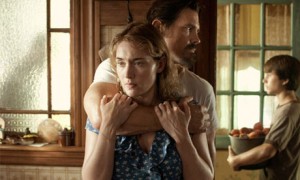film review: labor day
The title of Jason Reitman’s latest film, ‘Labor Day’ is apt; watching it is akin to enduring 24 hours of punishment.
The film is a romantic drama which follows 13-year-old Henry (Gattlin Griffith) and his reclusive and depressed divorcee mother, Adele (Kate Winslett). Henry suffers on his mother’s behalf and longs to fill the void in her life, which he perceives to be the absence of a husband. Luckily, the pair are abducted and held hostage by a mysterious rugged murderer, Frank (Josh Groslin), who has escaped prison and is using their house to hide from police.
Say good-bye to online dating and say hello to Stockholm syndrome; being held captive is the new Hollywood craze for finding your soul mate!
Between tenderly tying the knots round Adele’s wrist and pressing her tight against his rippling pectorals to hold her still, his hot hand shoved in her mouth, real-man Frank reinvigorates his hostage’s sensuality.
Turns out, Frank’s actually an A + guy whose criminal record has misunderstood him. He’s a generous handyman; he cleans out the gutters, changes Adele’s car tires, and oils the creaking door in the kitchen. More so, Frank relates to Henry through baseball and baking, becoming a father figure. Within two days of being held captive, Adele falls for him. Within four days, she decides to run away with him to Canada. Unfortunately, the police arrest Frank and the pair have to wait until he’s released from jail twenty years later to live their happily ever after.
As Chris Nashawaty put it, Labor Day is ‘pseudo romantic hooey’. It vaguely attempts to pursue messages about false stereotyping and misunderstanding, and does successfully draw attention to the sometimes devastating effects of miscarriage and post-natal depression. But unfortunately, these messages are quickly dropped and forgotten in lieu of another goal: to hurry our hearts with its romance novel plot.
And despite good performances by Winslet and Brolin, there’s no rectifying this slow paced, ‘weird hostage love story’.
The only thing which brings the fraying threads of this film together is a consistent theme of male competence. Men are portrayed as superior in both masculine and feminine roles. They are not only stronger, more skilful, stable, and rational than women, but also better parents, kinder and more emotionally attentive. We need only glance at female characters to spot this juxtaposition.
Adele is fragile and unkempt. Though her sad expression is stuck, her hands tremble uncontrollably, symbolising emotional instability. That this instability renders her incompetent is highlighted when she shakes too hard to finish the pie she is cooking; a not so subtle metaphor when Frank holds her hands steady to assist, remarking ‘help me put a roof on this house’.
Then there’s Evelyn (Brooke Smith), who slaps her disabled son just moments after Frank was teaching him baseball and ruffling his hair. The movie even culminates with a shot of Frank’s ex-wife cheating on him and then drowning their newborn in a bathtub.
By harsh contrast, there’s the male neighbour (JK Simmons) who brings Adele buckets of home-grown peaches, a kind policeman (James Van Der Beek) and a well-meaning ex-husband (Clarke Gregg) who, when Adele abandons Henry to him, welcomes his son into his family and gives him a happy life. But even these men fade in the shadow of Frank, the hunk whose coarse beard and pesky murder convictions disguise a face of morality and love.
Even when male characters’ have committed great wrongs, we discover that they have simply been misunderstood, and are chastised for ever doubting their moral superiority. How could we have had reservations about trustworthy convict, Frank? He only nudged his wife (into a metal heater) because he was distraught by her cruelty! It’s disappointing that this justification of violence against women has successfully convinced some viewers. Trey Hock comments that Frank has ‘a heart full of gold’ that’s ‘too good to be true’.
Though it may well be true that there is light and dark in everyone, unfortunately Labor Day saves all the dark for one sex and all the light for another.
Perhaps what’s more upsetting than the film itself is its reminder that women are still expected to lust for male dominance. Labor Day, like much of the romance genre, asks women to imagine themselves as fragile victims whose utopia will be a dark and mysterious man; their freedom paradoxically arriving when they relinquish control to him.
Indeed it is Frank’s dangerous power over Adele which is the hallmark of his seduction. His hand lingers on her thigh while she’s bound, and his spoon feeding her is depicted with warm, stirring lighting. A psychologist may well interpret the film’s entire plot as kudos to Stockholm syndrome, where powerless hostages come to admire their captor for self-preservation.
As if all this wasn’t shocking enough, Labor Day also has a go at misrepresenting mental illness. The film presents post-natal depression, significant anxiety and agoraphobia as personal failures which women can be cured of by a good bang or two; in his own words, Frank ‘came to save’ Adele.
Really, it’s too bad that Frank can’t save this film.



Totally get your perspective Caitlin, but I would have appreciated a spoiler warning!
(not that I was planning on seeing the film, but still)